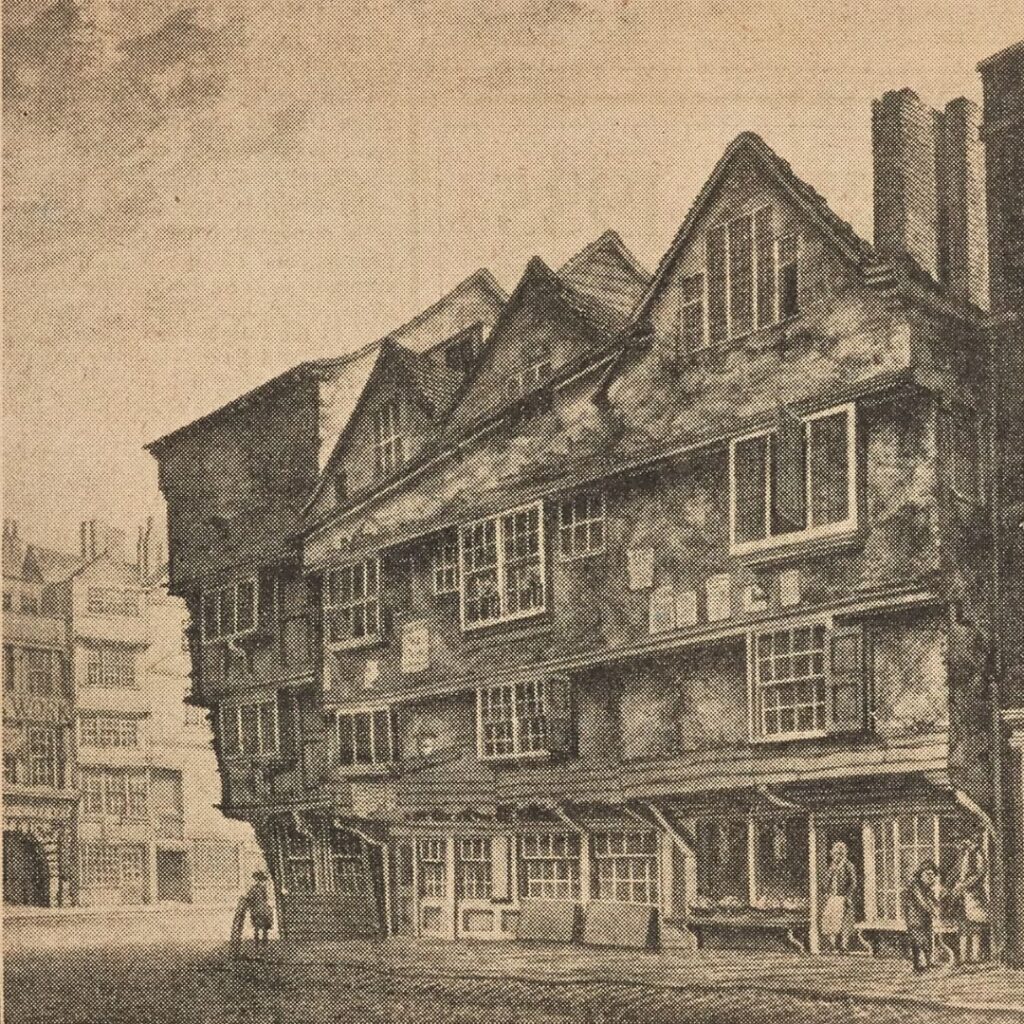
The Rainbow and Sweeney Todd’s
At 14, Fleet Street, stood ‘The Rainbow’, which opened its doors in 1657 as one of the earliest coffee houses in Britain. It thrived as a coffee house into the eighteenth century, but it does not figure in Ralph Rylance’s The Epicure’s Almanack (1815), either as a coffee house or a tavern offering food. In 1866 John Timbs ( Curiosities of London ) reported that ‘ it has long been a tavern; all the old rooms have been swept away and a large and lofty dining- room erected in their place’
By 1897, when the novelist Arnold Bennett paid a visit, it had settled into its role as an old fashioned City pub and restaurant. Here is his diary entry for July 13th 1897:
‘I lunched at the Rainbow, a type of City restaurant which is passing away. A large dark room sombrely furnished in mahogany and gas-lighted , even in the sunshine of a hot July day. In the centre a table at which a stout carver in white cap, coat and apron, carves the saddle of mutton and the sirloin of beef—dishes which are never varied and of which the customers seem never to tire. Here come lawyers and other homes d’affaires of middle-age to who luncheon is a serious meal, not to be ordered without minute obstructions to the obsequious water. ‘ Do you call this underdone ?’ , a portly customer asks sharply. ‘Yes, sir‘. ‘Well I don’t. Take It back’. ‘Yes, sir’. Here one drinks either stout from a tankard, or some sound wine; but if one orders wine, one gives the waiter directions as to the temperature. It is de rigeur. The door leading into the dining-room is labelled ‘coffee-room‘ and there is a significant notice ‘ Ladies dining room upstairs ‘. Ladies are not willingly admitted to the ground floor, and those women, if any, who dared to pass that door labelled ‘ coffee-room’ would be requested to leave , or at least pointed at as unwomanly. This is one of the last strongholds of the conservative male. Yet we males respect ourselves; or we have a regard for the decencies. ‘Gentlemen are requested not to smoke pipes in this establishment.’
Writing in the era of the ‘ New Woman ‘, Bennett is conscious of the discrimination against women in the public sphere, but it is to his credit that he pointed this out, even though the comment was made in a diary.
In the 1920’s the journalist Anthony Bertram ( see earlier Jot ) was another writer who haunted the ‘Rainbow.’ J. C. Squire and Hilaire Belloc were fellow drinkers and both favoured whiskers. According to Bertram, Squire was very difficult to identify.
‘ Whiskers and moustaches grew on and off him with amazing rapidity. Once in the Rainbow…Squire came in particularly hirsute, and Priestley said to me: ‘ I don’t think a man has any right to muck about with his face like that. A man’s face belongs to his friends. I’ve got to make up my mind all over again whether I want to know Jack Squire.’
Belloc used to come into the ‘Rainbow’ too, delicately and permanently whiskered, and often accompanied by Beachcomber, about who I could tell so many stories that I cannot begin: of how he listened at a pillar box till a crown collected; of how he posed as the man in charge of a charabanc; of how he made barbers sing in chorus; of how he jumped on his hat in the middle of South Harting High Street and shook the local grocer by the scruff of his neck; of how he roared like a lion in the Strand; of how, in short, he lived up to his fantastic imagination .’
The journalist ‘ Beachcomber’, alias J. B. Morton, wrote the ‘ By the Way’ column for the Daily Express from 1924 to 1975. At first he wrote the column in the offices of the Daily Express in Fleet Street. As the column only took a few hours, and he always wrote a week in advance, his afternoons were free for socialising. However,
following his marriage in 1927 and his subsequent move to Sussex, his drinking days with his fellow journalists were severely curtailed. Nevertheless, he became friends with another Sussex resident and fellow Catholic, Hilaire Belloc, with who he shared some political views. The pillar box anecdote is certainly true. According to one source, ‘while walking through Guildford one day with Gerald Barry, Morton stopped at a pillar box. He talked into its opening. ‘Are you alright, my little man? Don’t worry, we’ll soon get you out.’ Soon, a concerned crowd gathered to see who was trapped inside. Someone summoned the fire brigade to help, while Morton and Barry made a discrete exit. Events like this were quite frequent: on another occasion he littered Virginia’s Woolf’s front doorstep with dozens of empty, quart-sized brown beer bottles.
Continue reading